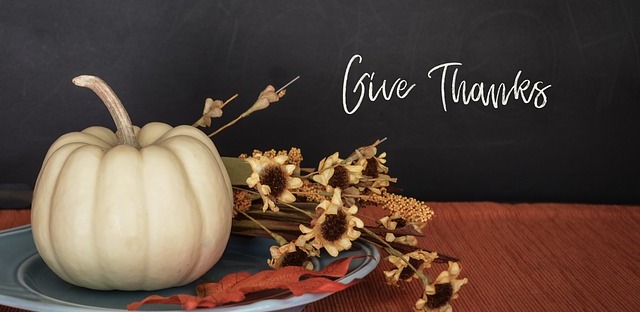There is a mentality in most Western societies that we are entitled certain rights, such as freedom, respect, and the pursuit of happiness. A few people have even taken this to such an extreme that they see most people as peasants serving them (the god or goddess) of the universe—a narcissistic mentality! However, what if we lived lives that were opposite this mentality? What if we realized that no one really owes us anything on this green planet, and that everything good we get is really a gift? There have been countless studies done that have shown that gratitude helps not only boost our mood levels, it can help alleviate many physical ailments as well.
One way we can show gratitude is in how we treat others. I think one aspect of showing gratitude for the people that are in our lives is by treasuring them. Never treat anyone as if they were dispensable or take someone for granted. Unfortunately, most people, including me, have taken someone for granted at one point or another in our lives. We assumed that they would always be there for us to serve our needs and make us happy. However, if we realized just how much of an impact they have made in our lives, and how limited a time we may have with these people, we might treat them more as royalty, rather than as slaves or servants.
Another way we can show gratitude to other people is by giving grace to them. My definition of showing grace to people is to loving them, flaws and all, being willing to learn from them, and by forgiving them. We love others by not giving up on them even after they have made a mistake or hurt you. Yes, there may be situations in which we cannot be with someone after they hurt us because they pose a physical or emotional threat to our safety and that of other loved ones. However, that does not mean we should harbor hatred or bitterness towards them, as it will only hurt us in the end, not the offender. I know several people who have hurt me emotionally, and who I initially had bitterness and anger towards them, but then when I forgave them, the relationship was able to be restored. We should also be constantly striving to learn from the people around us, both for our and their benefit. We learn so that we can understand the people around us better and form stronger connections with others. We also learn from others so that we can better care for those around us. Finally, we learn from others in our appreciation for their uniqueness and what they contribute to this world—including ourselves.
However, when we harbor an entitlement attitude, this erodes our ability to be grateful for those in our lives. First of all, an entitlement mentality brings about complaining and judgments against others, especially when they don’t meet what we perceive to be our needs. For instance, the gunman in the recent Mercy Hospital shooting had wanted the engagement ring from his ex-fiancee back so badly that he felt like he had to kill to get it.(1) In other words, the gunman felt that she owed him the ring that he gave her back because they broke up, and he judged her to be a wicked person because she probably did not want to give it back to him.
This same entitlement attitude also impedes forgiveness and reconciliation because of the element of pride in entitlement. Proud people are not inclined to forgive others because they think they are always right and that the other party “deserves”their anger and bitterness. Forgiveness requires some measure of humility because part of forgiveness is the willingness to share in some of the consequences of someone else’s sin. For instance, if you forgive a family member for their alcoholism and the effects of it, you may still have to deal with their recovery process or deal with a couple of relapses. However, if you are not willing to forgive and feel that they owe you something back, then reconciliation and freedom from the effects of the offense will not really be possible.
Another way we can show gratitude is by being thankful for the material possessions given to us. One way to be grateful for our material possessions is by enjoying them. Enjoying them does not mean being wasteful or taking what we have for granted. Enjoying our material possessions means to be joyful in interacting with our gifts. It also means being grateful to those who gave them to us. Another way we can be grateful for the material possessions we have is to see them as gifts, not as wages owed us. When we see possessions as gifts, we are often more appreciative of them, especially when we know that someone sacrificed financially to give them to us.
However, an entitlement attitude completely destroys our joy and gratitude in the things we are given. This is because it completely devalues the gift and giver, since instead of something to be treasured and enjoyed, we have it because we “deserve” it,or it is “owed” to us. We may not enjoy the gift or gifts as much, because of the fear of it being destroyed or devalued. Also, an entitlement attitude toward the material possessions we have encourages greed and selfishness, because it breeds the further mentality of being “owed” more than we have now. It also breeds selfishness because, with an entitlement attitude, we are often less willing to share our material goods to those in need. We think we “earned” these gifts,and that no one should take them away from us.
What a difference we could make if we strove to be more grateful for each person and each gift we were given! However, when we have an entitlement attitude and are ungrateful for the grace that is given to us each day, we lose our joy and love in life and for others. Since it is a time to give thanks, who in your life, can you thank today? Maybe write them a note of gratitude, or tell them in person how much they mean to you. As for the many material gifts we are blessed with, enjoy them, but also be willing to share with those in need so that they can have joy too.
Sources:
- Gorner, Jeremy, Annie Sweeney and Elyssa Cherney. (2018, November 20).Gunman in Mercy Hospital attack had threatened to shoot up Chicago Fire Academy, officials say. Chicago Tribune. p. 1, Retrieved from : https://www.chicagotribune.com/news/local/breaking/ct-met-chicago-mercy-hospital-shooting-juan-lopez-20181120-story.html


This was so interesting ! A recent customer service experience of mine opened me up to understanding how people don’t treat others with as much kindness and gratitude as they deserve – a timely reminder this holiday season.
Ebony x
http://www.theblackandwhiteguide.com
LikeLike
That’s why I strive to be thankful of the people that go out of their way to help others. It really does make their day when we take time to appreciate all of their hard work, and even motivates them to repeat the kind deed.
LikeLike
I’ve noticed that this generation of children are the one that believe that are entitlement to almost everything. They really do not give any gratitude for ideas that they receive.
LikeLike
I know, and it’s really sad. What are their parents teaching them?
LikeLike
I think we can all start with the people around us. I try to take time to make sure those in my life feel appreciated and supported even if it’s just tagging them in funny memes on the internet.
LikeLike
Entitlement is tricky. Because, yes, treat people well. But also the older generation feels like Xennials are entitled but I don’t think that’s totally fair.
Blu
http://Www.liveloveblu.com | wellness & healthy living
LikeLike
I think this whole society has an issue with entitlement, not just Xennials.
LikeLike
Great post! I try to live by example. I have a gratitude journal and try to be grateful for everything in my life. I can only pray that my daughter lives that way
LikeLike
Awesome! I know it gets tough sometimes, but keep on keeping on!
LikeLike
Sadly this is true. We should all be grateful for what we have and around this time of the year especially. It’s all about giving not taking!
LikeLike
Amen to what you said! Mary, I totally agree with you!
LikeLike
I think everyone is guilty of taking a loved one for granted sometimes. (I know that I am guilty of that!) We can move into a better place of appreciating them when we take the time to count our blessings and try to serve our loved ones in return.
LikeLike
Yes, I am guilty of that as well. The thing with both of us is we must be intentional about being grateful, otherwise it will fall by the way side.
LikeLiked by 1 person
Such a beautiful post. We can all take things for granted at times right. I am trying to have more of a positive mindset. It really makes all the difference.
LikeLike
I agree with having a more positive mindset!
LikeLike
Another wonderfully written post… I always show gratitude but haven’t quite figured out yet how to make sure younger people like my niece & nephew don’t fall into the entitlement trap so many young people feel these days
LikeLike
Hal, I would introduce your niece and nephew to stories of people who sacrificed everything for the good of someone else–maybe a biography or autobiography of that person’s life, and then discuss the story with them.
LikeLike
Agree! Very wise words. I too don’t like being taken for granted nor would I do that.
LikeLike
Great! 🙂
LikeLike
in our society entitlement is so prevalent. My husband and I work hard to make sure our kids do not grow up feeling entitled.
LikeLike
I totally agree with you. You seem like a very loving and down-to-earth parent, a rare gem these days!
LikeLike
Finding gratitude is lacking in many people’s lives. People are quick to focus on the negative. Wouldn’t a little positivity go a long way
LikeLike